Economic Growth and Invention of New Technologies | Report
VerifiedAdded on 2022/08/09
|16
|4144
|31
AI Summary
Hello! need advanced e-native author. A -work. For Chicago Il Tech Un. In attachments a list of course literature, as well as examples of good and bad writing! i need the best! If you need graphs and tables, please use them. 12 double-spaced pages
Contribute Materials
Your contribution can guide someone’s learning journey. Share your
documents today.
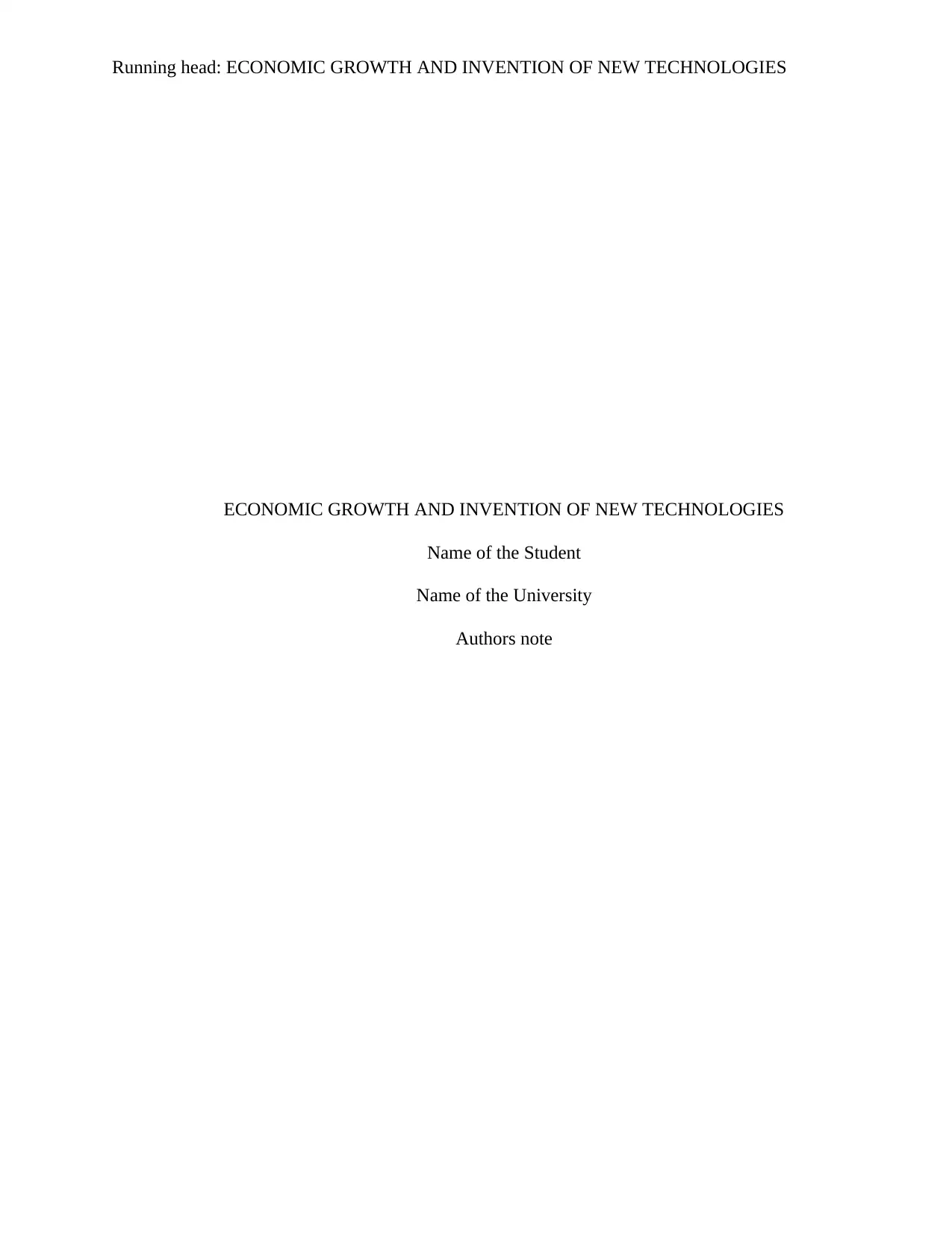
Running head: ECONOMIC GROWTH AND INVENTION OF NEW TECHNOLOGIES
ECONOMIC GROWTH AND INVENTION OF NEW TECHNOLOGIES
Name of the Student
Name of the University
Authors note
ECONOMIC GROWTH AND INVENTION OF NEW TECHNOLOGIES
Name of the Student
Name of the University
Authors note
Secure Best Marks with AI Grader
Need help grading? Try our AI Grader for instant feedback on your assignments.
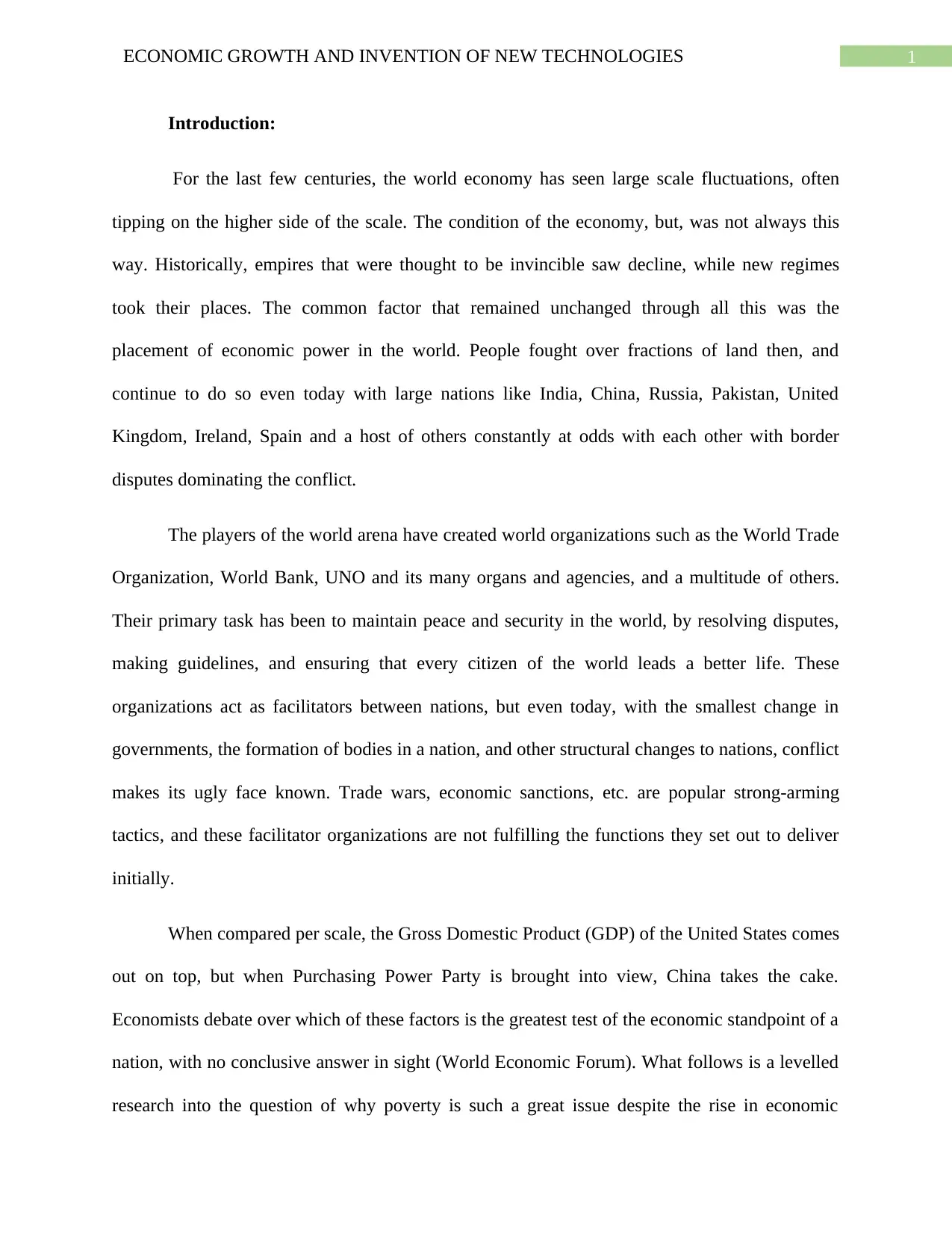
1ECONOMIC GROWTH AND INVENTION OF NEW TECHNOLOGIES
Introduction:
For the last few centuries, the world economy has seen large scale fluctuations, often
tipping on the higher side of the scale. The condition of the economy, but, was not always this
way. Historically, empires that were thought to be invincible saw decline, while new regimes
took their places. The common factor that remained unchanged through all this was the
placement of economic power in the world. People fought over fractions of land then, and
continue to do so even today with large nations like India, China, Russia, Pakistan, United
Kingdom, Ireland, Spain and a host of others constantly at odds with each other with border
disputes dominating the conflict.
The players of the world arena have created world organizations such as the World Trade
Organization, World Bank, UNO and its many organs and agencies, and a multitude of others.
Their primary task has been to maintain peace and security in the world, by resolving disputes,
making guidelines, and ensuring that every citizen of the world leads a better life. These
organizations act as facilitators between nations, but even today, with the smallest change in
governments, the formation of bodies in a nation, and other structural changes to nations, conflict
makes its ugly face known. Trade wars, economic sanctions, etc. are popular strong-arming
tactics, and these facilitator organizations are not fulfilling the functions they set out to deliver
initially.
When compared per scale, the Gross Domestic Product (GDP) of the United States comes
out on top, but when Purchasing Power Party is brought into view, China takes the cake.
Economists debate over which of these factors is the greatest test of the economic standpoint of a
nation, with no conclusive answer in sight (World Economic Forum). What follows is a levelled
research into the question of why poverty is such a great issue despite the rise in economic
Introduction:
For the last few centuries, the world economy has seen large scale fluctuations, often
tipping on the higher side of the scale. The condition of the economy, but, was not always this
way. Historically, empires that were thought to be invincible saw decline, while new regimes
took their places. The common factor that remained unchanged through all this was the
placement of economic power in the world. People fought over fractions of land then, and
continue to do so even today with large nations like India, China, Russia, Pakistan, United
Kingdom, Ireland, Spain and a host of others constantly at odds with each other with border
disputes dominating the conflict.
The players of the world arena have created world organizations such as the World Trade
Organization, World Bank, UNO and its many organs and agencies, and a multitude of others.
Their primary task has been to maintain peace and security in the world, by resolving disputes,
making guidelines, and ensuring that every citizen of the world leads a better life. These
organizations act as facilitators between nations, but even today, with the smallest change in
governments, the formation of bodies in a nation, and other structural changes to nations, conflict
makes its ugly face known. Trade wars, economic sanctions, etc. are popular strong-arming
tactics, and these facilitator organizations are not fulfilling the functions they set out to deliver
initially.
When compared per scale, the Gross Domestic Product (GDP) of the United States comes
out on top, but when Purchasing Power Party is brought into view, China takes the cake.
Economists debate over which of these factors is the greatest test of the economic standpoint of a
nation, with no conclusive answer in sight (World Economic Forum). What follows is a levelled
research into the question of why poverty is such a great issue despite the rise in economic
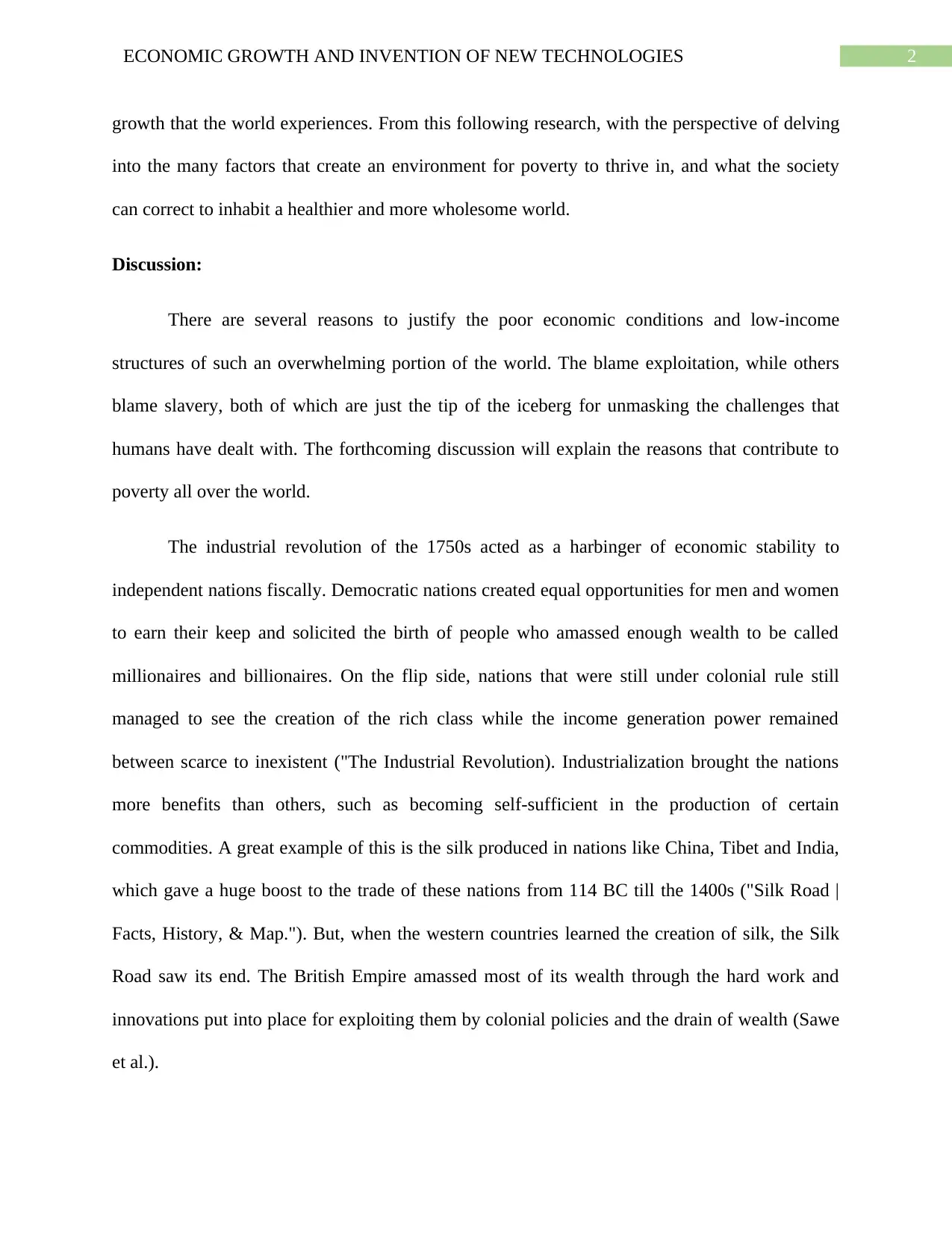
2ECONOMIC GROWTH AND INVENTION OF NEW TECHNOLOGIES
growth that the world experiences. From this following research, with the perspective of delving
into the many factors that create an environment for poverty to thrive in, and what the society
can correct to inhabit a healthier and more wholesome world.
Discussion:
There are several reasons to justify the poor economic conditions and low-income
structures of such an overwhelming portion of the world. The blame exploitation, while others
blame slavery, both of which are just the tip of the iceberg for unmasking the challenges that
humans have dealt with. The forthcoming discussion will explain the reasons that contribute to
poverty all over the world.
The industrial revolution of the 1750s acted as a harbinger of economic stability to
independent nations fiscally. Democratic nations created equal opportunities for men and women
to earn their keep and solicited the birth of people who amassed enough wealth to be called
millionaires and billionaires. On the flip side, nations that were still under colonial rule still
managed to see the creation of the rich class while the income generation power remained
between scarce to inexistent ("The Industrial Revolution). Industrialization brought the nations
more benefits than others, such as becoming self-sufficient in the production of certain
commodities. A great example of this is the silk produced in nations like China, Tibet and India,
which gave a huge boost to the trade of these nations from 114 BC till the 1400s ("Silk Road |
Facts, History, & Map."). But, when the western countries learned the creation of silk, the Silk
Road saw its end. The British Empire amassed most of its wealth through the hard work and
innovations put into place for exploiting them by colonial policies and the drain of wealth (Sawe
et al.).
growth that the world experiences. From this following research, with the perspective of delving
into the many factors that create an environment for poverty to thrive in, and what the society
can correct to inhabit a healthier and more wholesome world.
Discussion:
There are several reasons to justify the poor economic conditions and low-income
structures of such an overwhelming portion of the world. The blame exploitation, while others
blame slavery, both of which are just the tip of the iceberg for unmasking the challenges that
humans have dealt with. The forthcoming discussion will explain the reasons that contribute to
poverty all over the world.
The industrial revolution of the 1750s acted as a harbinger of economic stability to
independent nations fiscally. Democratic nations created equal opportunities for men and women
to earn their keep and solicited the birth of people who amassed enough wealth to be called
millionaires and billionaires. On the flip side, nations that were still under colonial rule still
managed to see the creation of the rich class while the income generation power remained
between scarce to inexistent ("The Industrial Revolution). Industrialization brought the nations
more benefits than others, such as becoming self-sufficient in the production of certain
commodities. A great example of this is the silk produced in nations like China, Tibet and India,
which gave a huge boost to the trade of these nations from 114 BC till the 1400s ("Silk Road |
Facts, History, & Map."). But, when the western countries learned the creation of silk, the Silk
Road saw its end. The British Empire amassed most of its wealth through the hard work and
innovations put into place for exploiting them by colonial policies and the drain of wealth (Sawe
et al.).
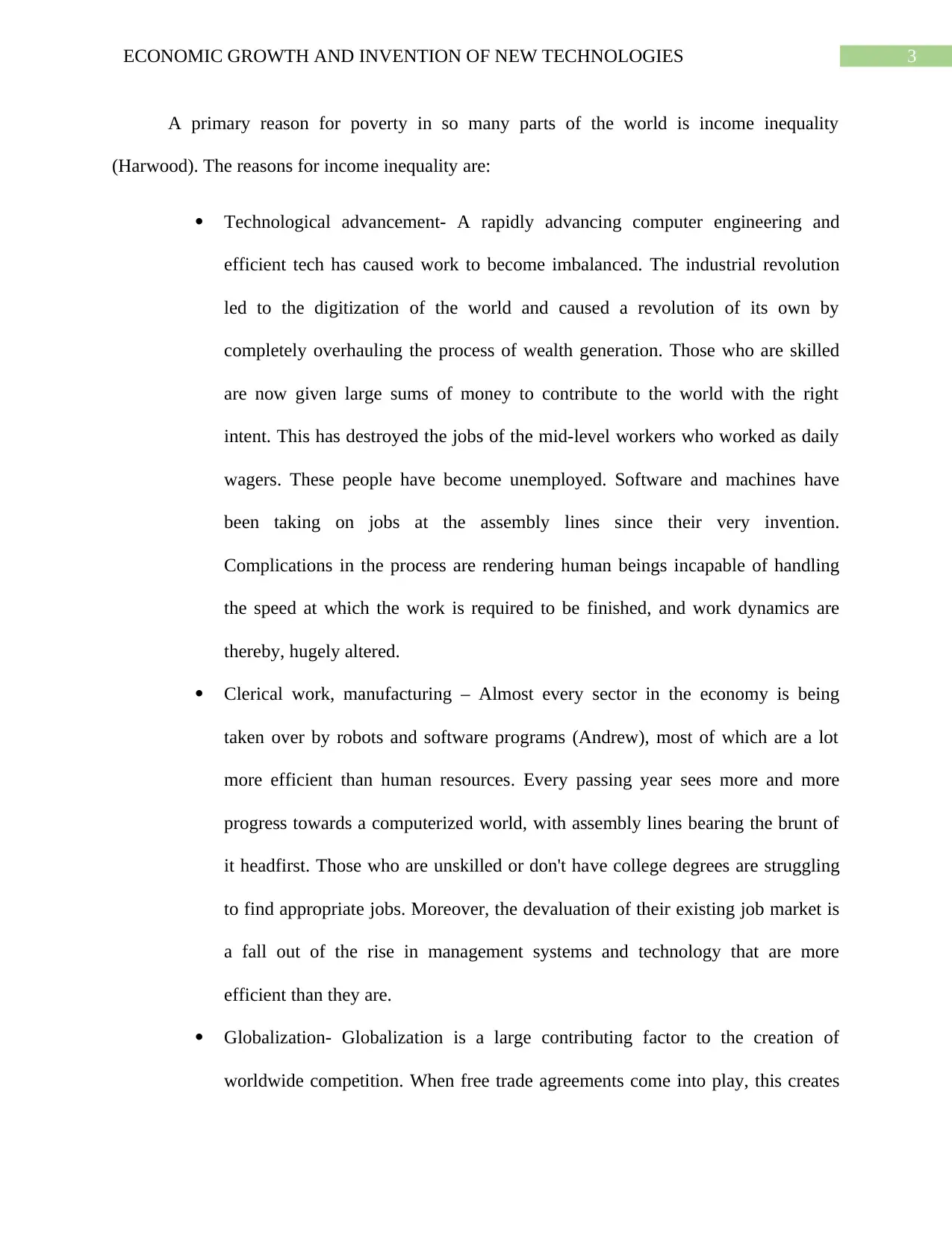
3ECONOMIC GROWTH AND INVENTION OF NEW TECHNOLOGIES
A primary reason for poverty in so many parts of the world is income inequality
(Harwood). The reasons for income inequality are:
Technological advancement- A rapidly advancing computer engineering and
efficient tech has caused work to become imbalanced. The industrial revolution
led to the digitization of the world and caused a revolution of its own by
completely overhauling the process of wealth generation. Those who are skilled
are now given large sums of money to contribute to the world with the right
intent. This has destroyed the jobs of the mid-level workers who worked as daily
wagers. These people have become unemployed. Software and machines have
been taking on jobs at the assembly lines since their very invention.
Complications in the process are rendering human beings incapable of handling
the speed at which the work is required to be finished, and work dynamics are
thereby, hugely altered.
Clerical work, manufacturing – Almost every sector in the economy is being
taken over by robots and software programs (Andrew), most of which are a lot
more efficient than human resources. Every passing year sees more and more
progress towards a computerized world, with assembly lines bearing the brunt of
it headfirst. Those who are unskilled or don't have college degrees are struggling
to find appropriate jobs. Moreover, the devaluation of their existing job market is
a fall out of the rise in management systems and technology that are more
efficient than they are.
Globalization- Globalization is a large contributing factor to the creation of
worldwide competition. When free trade agreements come into play, this creates
A primary reason for poverty in so many parts of the world is income inequality
(Harwood). The reasons for income inequality are:
Technological advancement- A rapidly advancing computer engineering and
efficient tech has caused work to become imbalanced. The industrial revolution
led to the digitization of the world and caused a revolution of its own by
completely overhauling the process of wealth generation. Those who are skilled
are now given large sums of money to contribute to the world with the right
intent. This has destroyed the jobs of the mid-level workers who worked as daily
wagers. These people have become unemployed. Software and machines have
been taking on jobs at the assembly lines since their very invention.
Complications in the process are rendering human beings incapable of handling
the speed at which the work is required to be finished, and work dynamics are
thereby, hugely altered.
Clerical work, manufacturing – Almost every sector in the economy is being
taken over by robots and software programs (Andrew), most of which are a lot
more efficient than human resources. Every passing year sees more and more
progress towards a computerized world, with assembly lines bearing the brunt of
it headfirst. Those who are unskilled or don't have college degrees are struggling
to find appropriate jobs. Moreover, the devaluation of their existing job market is
a fall out of the rise in management systems and technology that are more
efficient than they are.
Globalization- Globalization is a large contributing factor to the creation of
worldwide competition. When free trade agreements come into play, this creates
Secure Best Marks with AI Grader
Need help grading? Try our AI Grader for instant feedback on your assignments.
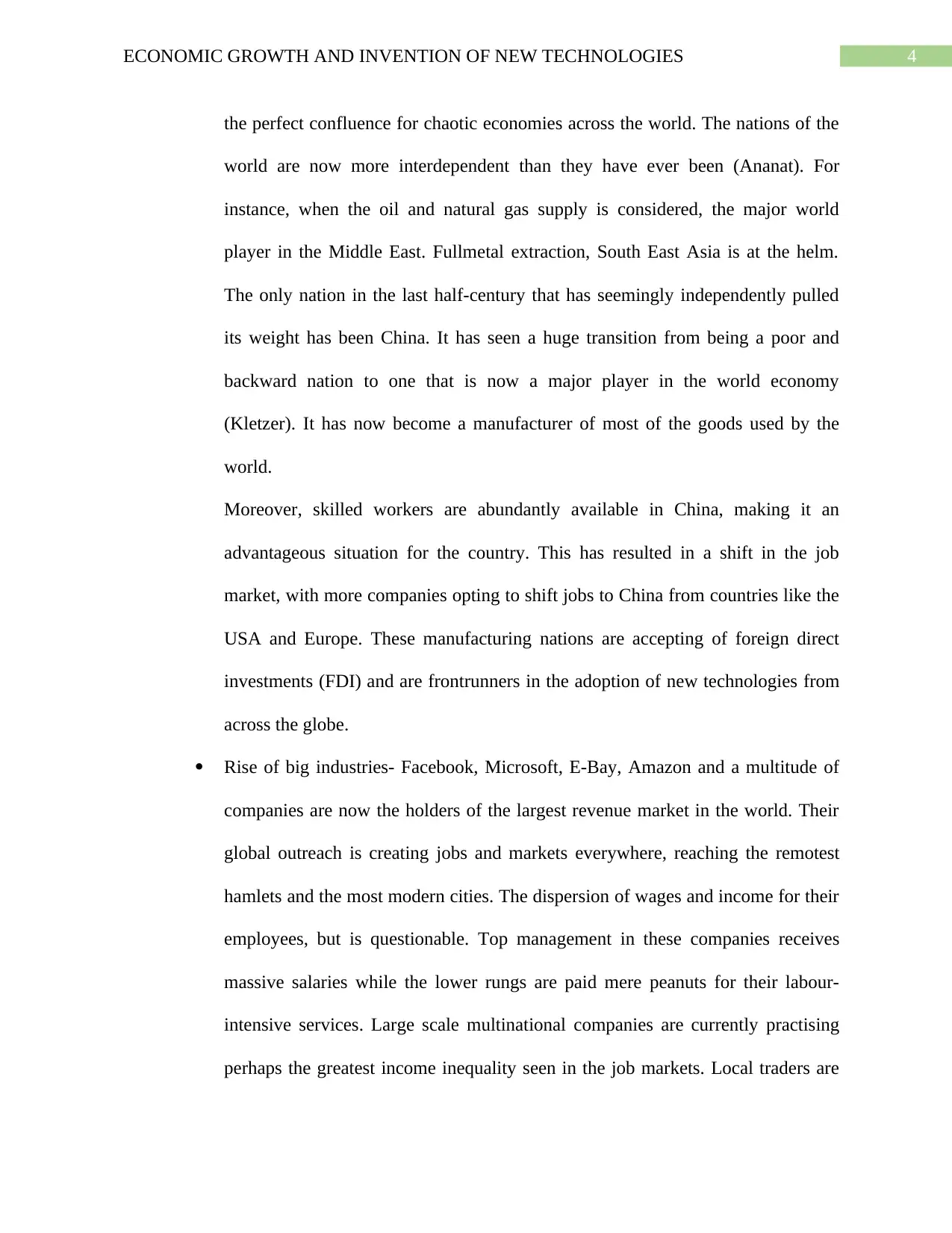
4ECONOMIC GROWTH AND INVENTION OF NEW TECHNOLOGIES
the perfect confluence for chaotic economies across the world. The nations of the
world are now more interdependent than they have ever been (Ananat). For
instance, when the oil and natural gas supply is considered, the major world
player in the Middle East. Fullmetal extraction, South East Asia is at the helm.
The only nation in the last half-century that has seemingly independently pulled
its weight has been China. It has seen a huge transition from being a poor and
backward nation to one that is now a major player in the world economy
(Kletzer). It has now become a manufacturer of most of the goods used by the
world.
Moreover, skilled workers are abundantly available in China, making it an
advantageous situation for the country. This has resulted in a shift in the job
market, with more companies opting to shift jobs to China from countries like the
USA and Europe. These manufacturing nations are accepting of foreign direct
investments (FDI) and are frontrunners in the adoption of new technologies from
across the globe.
Rise of big industries- Facebook, Microsoft, E-Bay, Amazon and a multitude of
companies are now the holders of the largest revenue market in the world. Their
global outreach is creating jobs and markets everywhere, reaching the remotest
hamlets and the most modern cities. The dispersion of wages and income for their
employees, but is questionable. Top management in these companies receives
massive salaries while the lower rungs are paid mere peanuts for their labour-
intensive services. Large scale multinational companies are currently practising
perhaps the greatest income inequality seen in the job markets. Local traders are
the perfect confluence for chaotic economies across the world. The nations of the
world are now more interdependent than they have ever been (Ananat). For
instance, when the oil and natural gas supply is considered, the major world
player in the Middle East. Fullmetal extraction, South East Asia is at the helm.
The only nation in the last half-century that has seemingly independently pulled
its weight has been China. It has seen a huge transition from being a poor and
backward nation to one that is now a major player in the world economy
(Kletzer). It has now become a manufacturer of most of the goods used by the
world.
Moreover, skilled workers are abundantly available in China, making it an
advantageous situation for the country. This has resulted in a shift in the job
market, with more companies opting to shift jobs to China from countries like the
USA and Europe. These manufacturing nations are accepting of foreign direct
investments (FDI) and are frontrunners in the adoption of new technologies from
across the globe.
Rise of big industries- Facebook, Microsoft, E-Bay, Amazon and a multitude of
companies are now the holders of the largest revenue market in the world. Their
global outreach is creating jobs and markets everywhere, reaching the remotest
hamlets and the most modern cities. The dispersion of wages and income for their
employees, but is questionable. Top management in these companies receives
massive salaries while the lower rungs are paid mere peanuts for their labour-
intensive services. Large scale multinational companies are currently practising
perhaps the greatest income inequality seen in the job markets. Local traders are
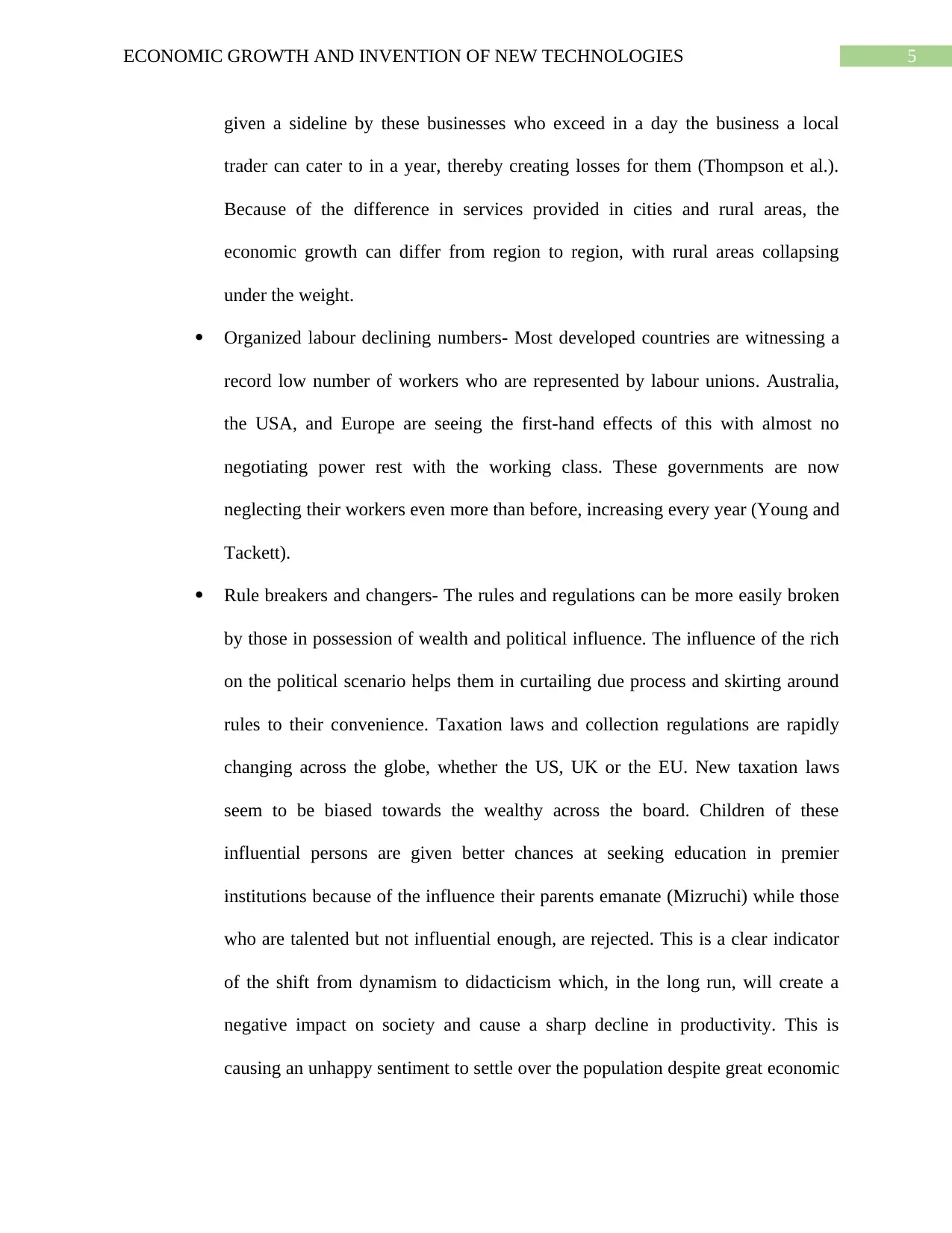
5ECONOMIC GROWTH AND INVENTION OF NEW TECHNOLOGIES
given a sideline by these businesses who exceed in a day the business a local
trader can cater to in a year, thereby creating losses for them (Thompson et al.).
Because of the difference in services provided in cities and rural areas, the
economic growth can differ from region to region, with rural areas collapsing
under the weight.
Organized labour declining numbers- Most developed countries are witnessing a
record low number of workers who are represented by labour unions. Australia,
the USA, and Europe are seeing the first-hand effects of this with almost no
negotiating power rest with the working class. These governments are now
neglecting their workers even more than before, increasing every year (Young and
Tackett).
Rule breakers and changers- The rules and regulations can be more easily broken
by those in possession of wealth and political influence. The influence of the rich
on the political scenario helps them in curtailing due process and skirting around
rules to their convenience. Taxation laws and collection regulations are rapidly
changing across the globe, whether the US, UK or the EU. New taxation laws
seem to be biased towards the wealthy across the board. Children of these
influential persons are given better chances at seeking education in premier
institutions because of the influence their parents emanate (Mizruchi) while those
who are talented but not influential enough, are rejected. This is a clear indicator
of the shift from dynamism to didacticism which, in the long run, will create a
negative impact on society and cause a sharp decline in productivity. This is
causing an unhappy sentiment to settle over the population despite great economic
given a sideline by these businesses who exceed in a day the business a local
trader can cater to in a year, thereby creating losses for them (Thompson et al.).
Because of the difference in services provided in cities and rural areas, the
economic growth can differ from region to region, with rural areas collapsing
under the weight.
Organized labour declining numbers- Most developed countries are witnessing a
record low number of workers who are represented by labour unions. Australia,
the USA, and Europe are seeing the first-hand effects of this with almost no
negotiating power rest with the working class. These governments are now
neglecting their workers even more than before, increasing every year (Young and
Tackett).
Rule breakers and changers- The rules and regulations can be more easily broken
by those in possession of wealth and political influence. The influence of the rich
on the political scenario helps them in curtailing due process and skirting around
rules to their convenience. Taxation laws and collection regulations are rapidly
changing across the globe, whether the US, UK or the EU. New taxation laws
seem to be biased towards the wealthy across the board. Children of these
influential persons are given better chances at seeking education in premier
institutions because of the influence their parents emanate (Mizruchi) while those
who are talented but not influential enough, are rejected. This is a clear indicator
of the shift from dynamism to didacticism which, in the long run, will create a
negative impact on society and cause a sharp decline in productivity. This is
causing an unhappy sentiment to settle over the population despite great economic
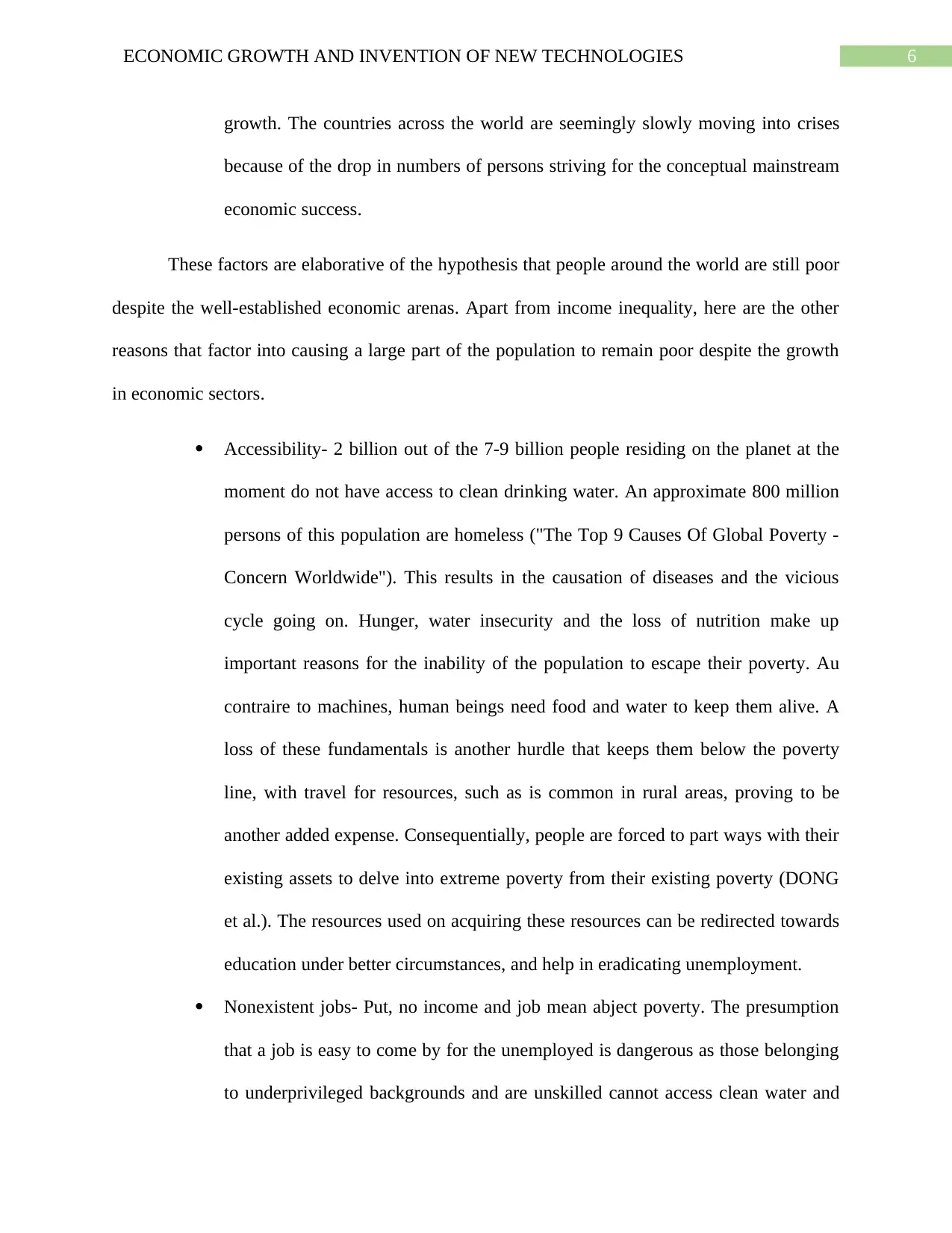
6ECONOMIC GROWTH AND INVENTION OF NEW TECHNOLOGIES
growth. The countries across the world are seemingly slowly moving into crises
because of the drop in numbers of persons striving for the conceptual mainstream
economic success.
These factors are elaborative of the hypothesis that people around the world are still poor
despite the well-established economic arenas. Apart from income inequality, here are the other
reasons that factor into causing a large part of the population to remain poor despite the growth
in economic sectors.
Accessibility- 2 billion out of the 7-9 billion people residing on the planet at the
moment do not have access to clean drinking water. An approximate 800 million
persons of this population are homeless ("The Top 9 Causes Of Global Poverty -
Concern Worldwide"). This results in the causation of diseases and the vicious
cycle going on. Hunger, water insecurity and the loss of nutrition make up
important reasons for the inability of the population to escape their poverty. Au
contraire to machines, human beings need food and water to keep them alive. A
loss of these fundamentals is another hurdle that keeps them below the poverty
line, with travel for resources, such as is common in rural areas, proving to be
another added expense. Consequentially, people are forced to part ways with their
existing assets to delve into extreme poverty from their existing poverty (DONG
et al.). The resources used on acquiring these resources can be redirected towards
education under better circumstances, and help in eradicating unemployment.
Nonexistent jobs- Put, no income and job mean abject poverty. The presumption
that a job is easy to come by for the unemployed is dangerous as those belonging
to underprivileged backgrounds and are unskilled cannot access clean water and
growth. The countries across the world are seemingly slowly moving into crises
because of the drop in numbers of persons striving for the conceptual mainstream
economic success.
These factors are elaborative of the hypothesis that people around the world are still poor
despite the well-established economic arenas. Apart from income inequality, here are the other
reasons that factor into causing a large part of the population to remain poor despite the growth
in economic sectors.
Accessibility- 2 billion out of the 7-9 billion people residing on the planet at the
moment do not have access to clean drinking water. An approximate 800 million
persons of this population are homeless ("The Top 9 Causes Of Global Poverty -
Concern Worldwide"). This results in the causation of diseases and the vicious
cycle going on. Hunger, water insecurity and the loss of nutrition make up
important reasons for the inability of the population to escape their poverty. Au
contraire to machines, human beings need food and water to keep them alive. A
loss of these fundamentals is another hurdle that keeps them below the poverty
line, with travel for resources, such as is common in rural areas, proving to be
another added expense. Consequentially, people are forced to part ways with their
existing assets to delve into extreme poverty from their existing poverty (DONG
et al.). The resources used on acquiring these resources can be redirected towards
education under better circumstances, and help in eradicating unemployment.
Nonexistent jobs- Put, no income and job mean abject poverty. The presumption
that a job is easy to come by for the unemployed is dangerous as those belonging
to underprivileged backgrounds and are unskilled cannot access clean water and
Paraphrase This Document
Need a fresh take? Get an instant paraphrase of this document with our AI Paraphraser
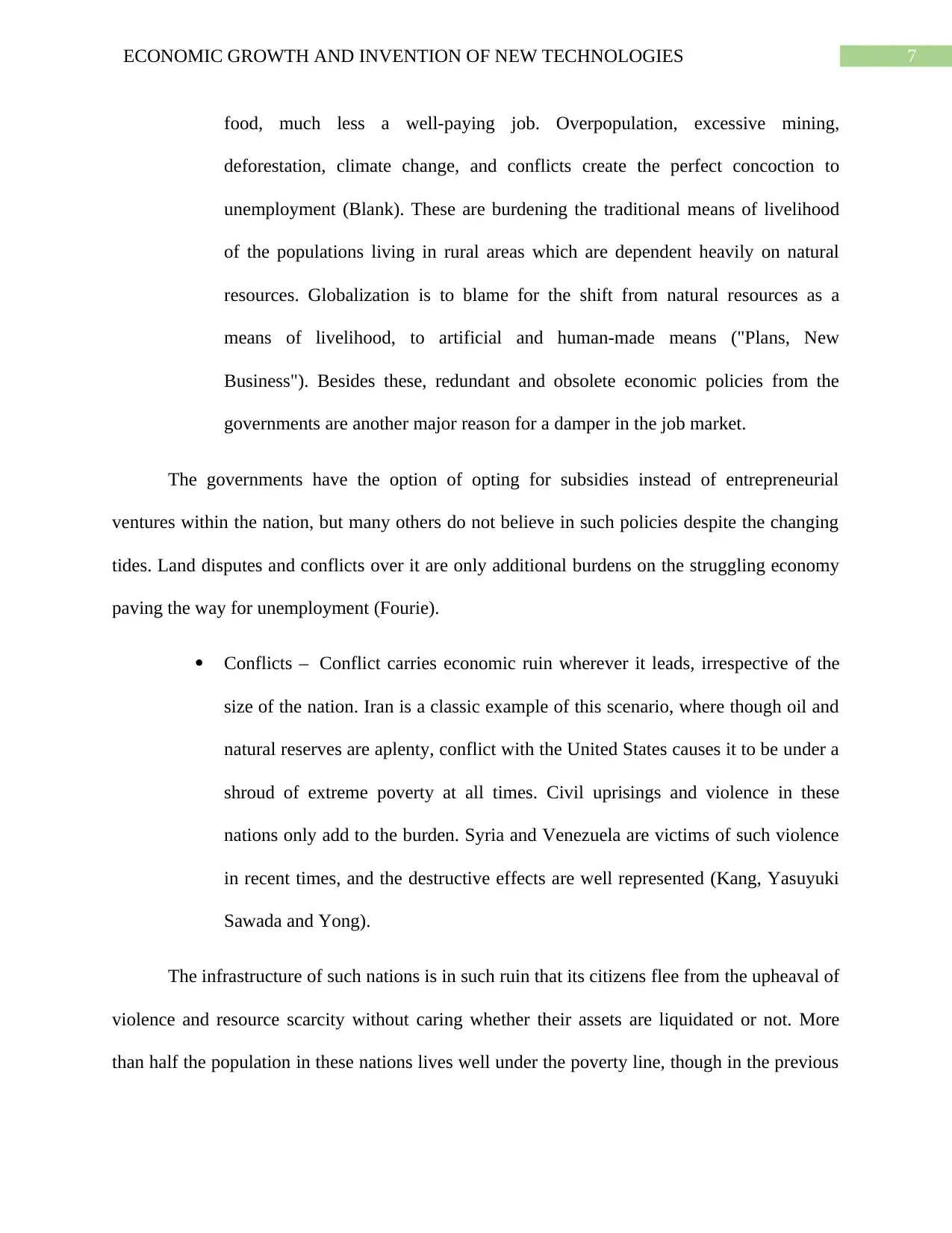
7ECONOMIC GROWTH AND INVENTION OF NEW TECHNOLOGIES
food, much less a well-paying job. Overpopulation, excessive mining,
deforestation, climate change, and conflicts create the perfect concoction to
unemployment (Blank). These are burdening the traditional means of livelihood
of the populations living in rural areas which are dependent heavily on natural
resources. Globalization is to blame for the shift from natural resources as a
means of livelihood, to artificial and human-made means ("Plans, New
Business"). Besides these, redundant and obsolete economic policies from the
governments are another major reason for a damper in the job market.
The governments have the option of opting for subsidies instead of entrepreneurial
ventures within the nation, but many others do not believe in such policies despite the changing
tides. Land disputes and conflicts over it are only additional burdens on the struggling economy
paving the way for unemployment (Fourie).
Conflicts – Conflict carries economic ruin wherever it leads, irrespective of the
size of the nation. Iran is a classic example of this scenario, where though oil and
natural reserves are aplenty, conflict with the United States causes it to be under a
shroud of extreme poverty at all times. Civil uprisings and violence in these
nations only add to the burden. Syria and Venezuela are victims of such violence
in recent times, and the destructive effects are well represented (Kang, Yasuyuki
Sawada and Yong).
The infrastructure of such nations is in such ruin that its citizens flee from the upheaval of
violence and resource scarcity without caring whether their assets are liquidated or not. More
than half the population in these nations lives well under the poverty line, though in the previous
food, much less a well-paying job. Overpopulation, excessive mining,
deforestation, climate change, and conflicts create the perfect concoction to
unemployment (Blank). These are burdening the traditional means of livelihood
of the populations living in rural areas which are dependent heavily on natural
resources. Globalization is to blame for the shift from natural resources as a
means of livelihood, to artificial and human-made means ("Plans, New
Business"). Besides these, redundant and obsolete economic policies from the
governments are another major reason for a damper in the job market.
The governments have the option of opting for subsidies instead of entrepreneurial
ventures within the nation, but many others do not believe in such policies despite the changing
tides. Land disputes and conflicts over it are only additional burdens on the struggling economy
paving the way for unemployment (Fourie).
Conflicts – Conflict carries economic ruin wherever it leads, irrespective of the
size of the nation. Iran is a classic example of this scenario, where though oil and
natural reserves are aplenty, conflict with the United States causes it to be under a
shroud of extreme poverty at all times. Civil uprisings and violence in these
nations only add to the burden. Syria and Venezuela are victims of such violence
in recent times, and the destructive effects are well represented (Kang, Yasuyuki
Sawada and Yong).
The infrastructure of such nations is in such ruin that its citizens flee from the upheaval of
violence and resource scarcity without caring whether their assets are liquidated or not. More
than half the population in these nations lives well under the poverty line, though in the previous
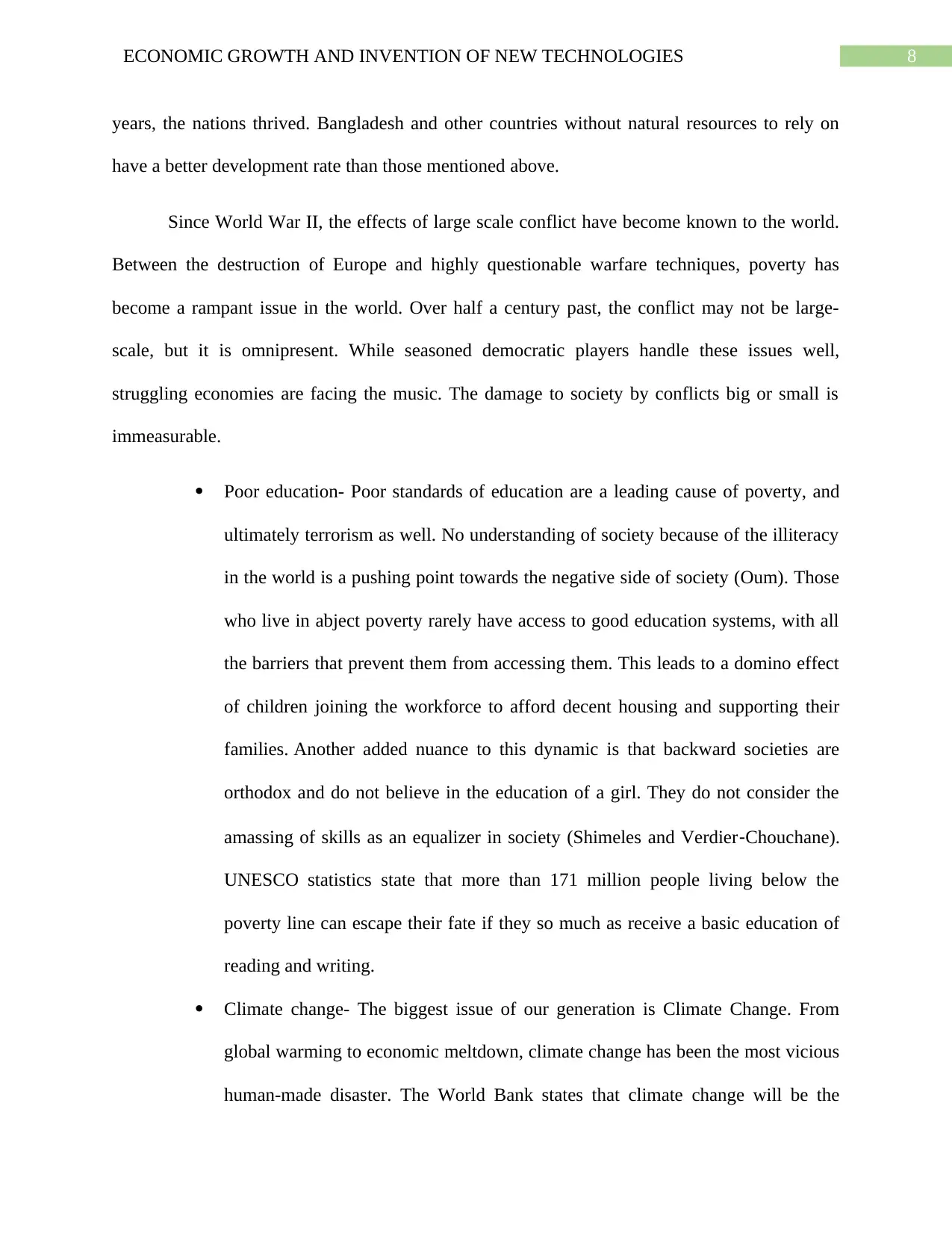
8ECONOMIC GROWTH AND INVENTION OF NEW TECHNOLOGIES
years, the nations thrived. Bangladesh and other countries without natural resources to rely on
have a better development rate than those mentioned above.
Since World War II, the effects of large scale conflict have become known to the world.
Between the destruction of Europe and highly questionable warfare techniques, poverty has
become a rampant issue in the world. Over half a century past, the conflict may not be large-
scale, but it is omnipresent. While seasoned democratic players handle these issues well,
struggling economies are facing the music. The damage to society by conflicts big or small is
immeasurable.
Poor education- Poor standards of education are a leading cause of poverty, and
ultimately terrorism as well. No understanding of society because of the illiteracy
in the world is a pushing point towards the negative side of society (Oum). Those
who live in abject poverty rarely have access to good education systems, with all
the barriers that prevent them from accessing them. This leads to a domino effect
of children joining the workforce to afford decent housing and supporting their
families. Another added nuance to this dynamic is that backward societies are
orthodox and do not believe in the education of a girl. They do not consider the
amassing of skills as an equalizer in society (Shimeles and Verdier‐Chouchane).
UNESCO statistics state that more than 171 million people living below the
poverty line can escape their fate if they so much as receive a basic education of
reading and writing.
Climate change- The biggest issue of our generation is Climate Change. From
global warming to economic meltdown, climate change has been the most vicious
human-made disaster. The World Bank states that climate change will be the
years, the nations thrived. Bangladesh and other countries without natural resources to rely on
have a better development rate than those mentioned above.
Since World War II, the effects of large scale conflict have become known to the world.
Between the destruction of Europe and highly questionable warfare techniques, poverty has
become a rampant issue in the world. Over half a century past, the conflict may not be large-
scale, but it is omnipresent. While seasoned democratic players handle these issues well,
struggling economies are facing the music. The damage to society by conflicts big or small is
immeasurable.
Poor education- Poor standards of education are a leading cause of poverty, and
ultimately terrorism as well. No understanding of society because of the illiteracy
in the world is a pushing point towards the negative side of society (Oum). Those
who live in abject poverty rarely have access to good education systems, with all
the barriers that prevent them from accessing them. This leads to a domino effect
of children joining the workforce to afford decent housing and supporting their
families. Another added nuance to this dynamic is that backward societies are
orthodox and do not believe in the education of a girl. They do not consider the
amassing of skills as an equalizer in society (Shimeles and Verdier‐Chouchane).
UNESCO statistics state that more than 171 million people living below the
poverty line can escape their fate if they so much as receive a basic education of
reading and writing.
Climate change- The biggest issue of our generation is Climate Change. From
global warming to economic meltdown, climate change has been the most vicious
human-made disaster. The World Bank states that climate change will be the
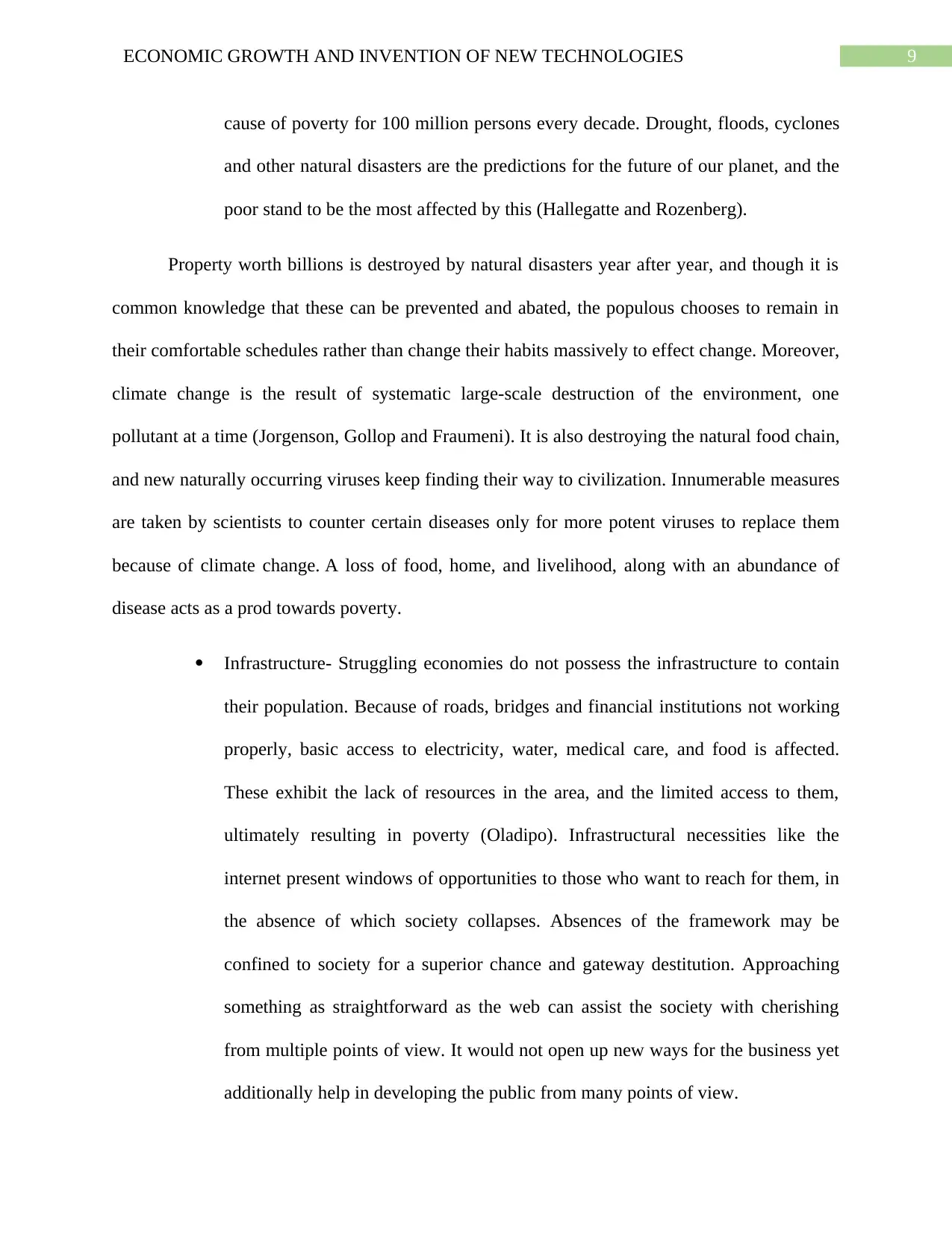
9ECONOMIC GROWTH AND INVENTION OF NEW TECHNOLOGIES
cause of poverty for 100 million persons every decade. Drought, floods, cyclones
and other natural disasters are the predictions for the future of our planet, and the
poor stand to be the most affected by this (Hallegatte and Rozenberg).
Property worth billions is destroyed by natural disasters year after year, and though it is
common knowledge that these can be prevented and abated, the populous chooses to remain in
their comfortable schedules rather than change their habits massively to effect change. Moreover,
climate change is the result of systematic large-scale destruction of the environment, one
pollutant at a time (Jorgenson, Gollop and Fraumeni). It is also destroying the natural food chain,
and new naturally occurring viruses keep finding their way to civilization. Innumerable measures
are taken by scientists to counter certain diseases only for more potent viruses to replace them
because of climate change. A loss of food, home, and livelihood, along with an abundance of
disease acts as a prod towards poverty.
Infrastructure- Struggling economies do not possess the infrastructure to contain
their population. Because of roads, bridges and financial institutions not working
properly, basic access to electricity, water, medical care, and food is affected.
These exhibit the lack of resources in the area, and the limited access to them,
ultimately resulting in poverty (Oladipo). Infrastructural necessities like the
internet present windows of opportunities to those who want to reach for them, in
the absence of which society collapses. Absences of the framework may be
confined to society for a superior chance and gateway destitution. Approaching
something as straightforward as the web can assist the society with cherishing
from multiple points of view. It would not open up new ways for the business yet
additionally help in developing the public from many points of view.
cause of poverty for 100 million persons every decade. Drought, floods, cyclones
and other natural disasters are the predictions for the future of our planet, and the
poor stand to be the most affected by this (Hallegatte and Rozenberg).
Property worth billions is destroyed by natural disasters year after year, and though it is
common knowledge that these can be prevented and abated, the populous chooses to remain in
their comfortable schedules rather than change their habits massively to effect change. Moreover,
climate change is the result of systematic large-scale destruction of the environment, one
pollutant at a time (Jorgenson, Gollop and Fraumeni). It is also destroying the natural food chain,
and new naturally occurring viruses keep finding their way to civilization. Innumerable measures
are taken by scientists to counter certain diseases only for more potent viruses to replace them
because of climate change. A loss of food, home, and livelihood, along with an abundance of
disease acts as a prod towards poverty.
Infrastructure- Struggling economies do not possess the infrastructure to contain
their population. Because of roads, bridges and financial institutions not working
properly, basic access to electricity, water, medical care, and food is affected.
These exhibit the lack of resources in the area, and the limited access to them,
ultimately resulting in poverty (Oladipo). Infrastructural necessities like the
internet present windows of opportunities to those who want to reach for them, in
the absence of which society collapses. Absences of the framework may be
confined to society for a superior chance and gateway destitution. Approaching
something as straightforward as the web can assist the society with cherishing
from multiple points of view. It would not open up new ways for the business yet
additionally help in developing the public from many points of view.
Secure Best Marks with AI Grader
Need help grading? Try our AI Grader for instant feedback on your assignments.
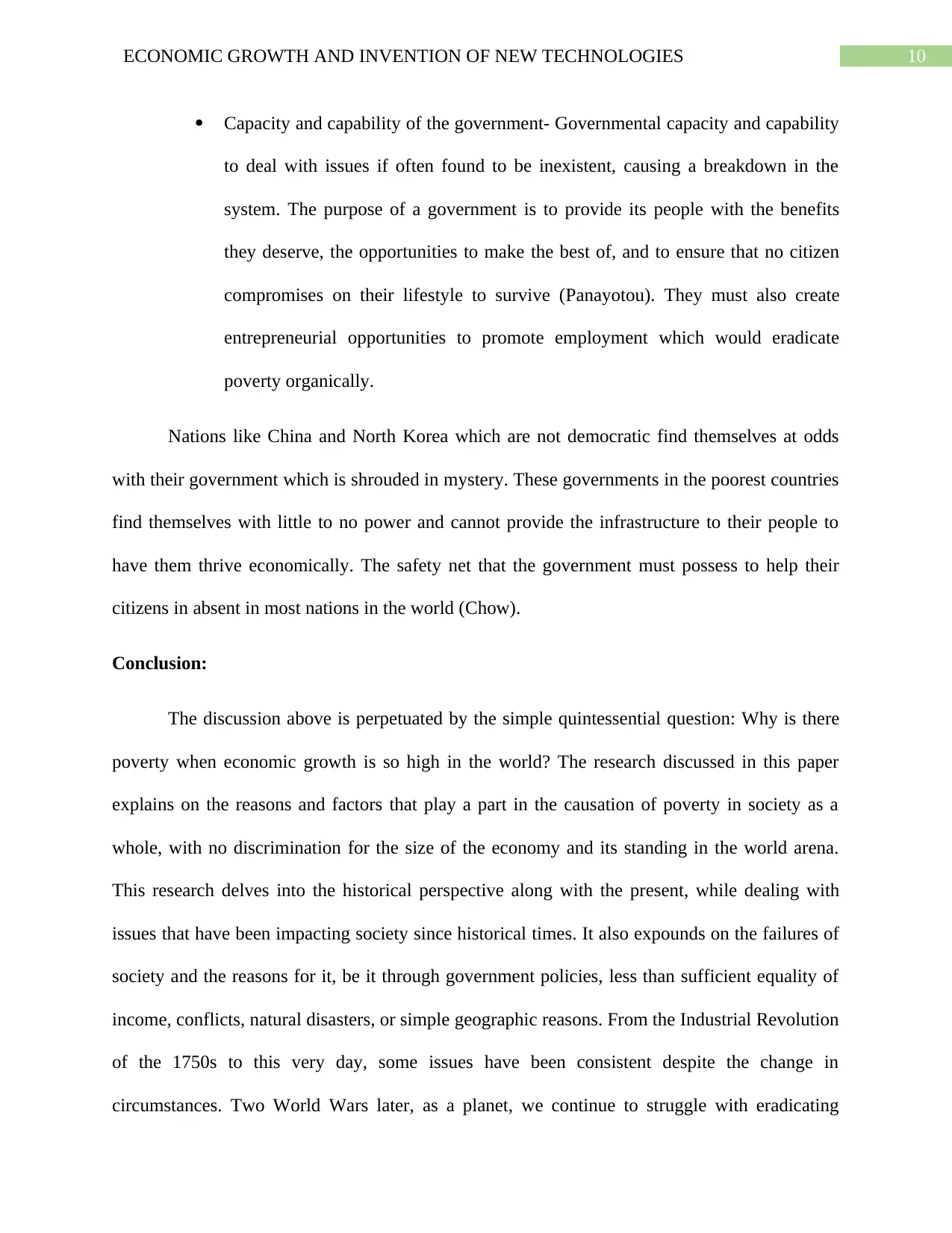
10ECONOMIC GROWTH AND INVENTION OF NEW TECHNOLOGIES
Capacity and capability of the government- Governmental capacity and capability
to deal with issues if often found to be inexistent, causing a breakdown in the
system. The purpose of a government is to provide its people with the benefits
they deserve, the opportunities to make the best of, and to ensure that no citizen
compromises on their lifestyle to survive (Panayotou). They must also create
entrepreneurial opportunities to promote employment which would eradicate
poverty organically.
Nations like China and North Korea which are not democratic find themselves at odds
with their government which is shrouded in mystery. These governments in the poorest countries
find themselves with little to no power and cannot provide the infrastructure to their people to
have them thrive economically. The safety net that the government must possess to help their
citizens in absent in most nations in the world (Chow).
Conclusion:
The discussion above is perpetuated by the simple quintessential question: Why is there
poverty when economic growth is so high in the world? The research discussed in this paper
explains on the reasons and factors that play a part in the causation of poverty in society as a
whole, with no discrimination for the size of the economy and its standing in the world arena.
This research delves into the historical perspective along with the present, while dealing with
issues that have been impacting society since historical times. It also expounds on the failures of
society and the reasons for it, be it through government policies, less than sufficient equality of
income, conflicts, natural disasters, or simple geographic reasons. From the Industrial Revolution
of the 1750s to this very day, some issues have been consistent despite the change in
circumstances. Two World Wars later, as a planet, we continue to struggle with eradicating
Capacity and capability of the government- Governmental capacity and capability
to deal with issues if often found to be inexistent, causing a breakdown in the
system. The purpose of a government is to provide its people with the benefits
they deserve, the opportunities to make the best of, and to ensure that no citizen
compromises on their lifestyle to survive (Panayotou). They must also create
entrepreneurial opportunities to promote employment which would eradicate
poverty organically.
Nations like China and North Korea which are not democratic find themselves at odds
with their government which is shrouded in mystery. These governments in the poorest countries
find themselves with little to no power and cannot provide the infrastructure to their people to
have them thrive economically. The safety net that the government must possess to help their
citizens in absent in most nations in the world (Chow).
Conclusion:
The discussion above is perpetuated by the simple quintessential question: Why is there
poverty when economic growth is so high in the world? The research discussed in this paper
explains on the reasons and factors that play a part in the causation of poverty in society as a
whole, with no discrimination for the size of the economy and its standing in the world arena.
This research delves into the historical perspective along with the present, while dealing with
issues that have been impacting society since historical times. It also expounds on the failures of
society and the reasons for it, be it through government policies, less than sufficient equality of
income, conflicts, natural disasters, or simple geographic reasons. From the Industrial Revolution
of the 1750s to this very day, some issues have been consistent despite the change in
circumstances. Two World Wars later, as a planet, we continue to struggle with eradicating
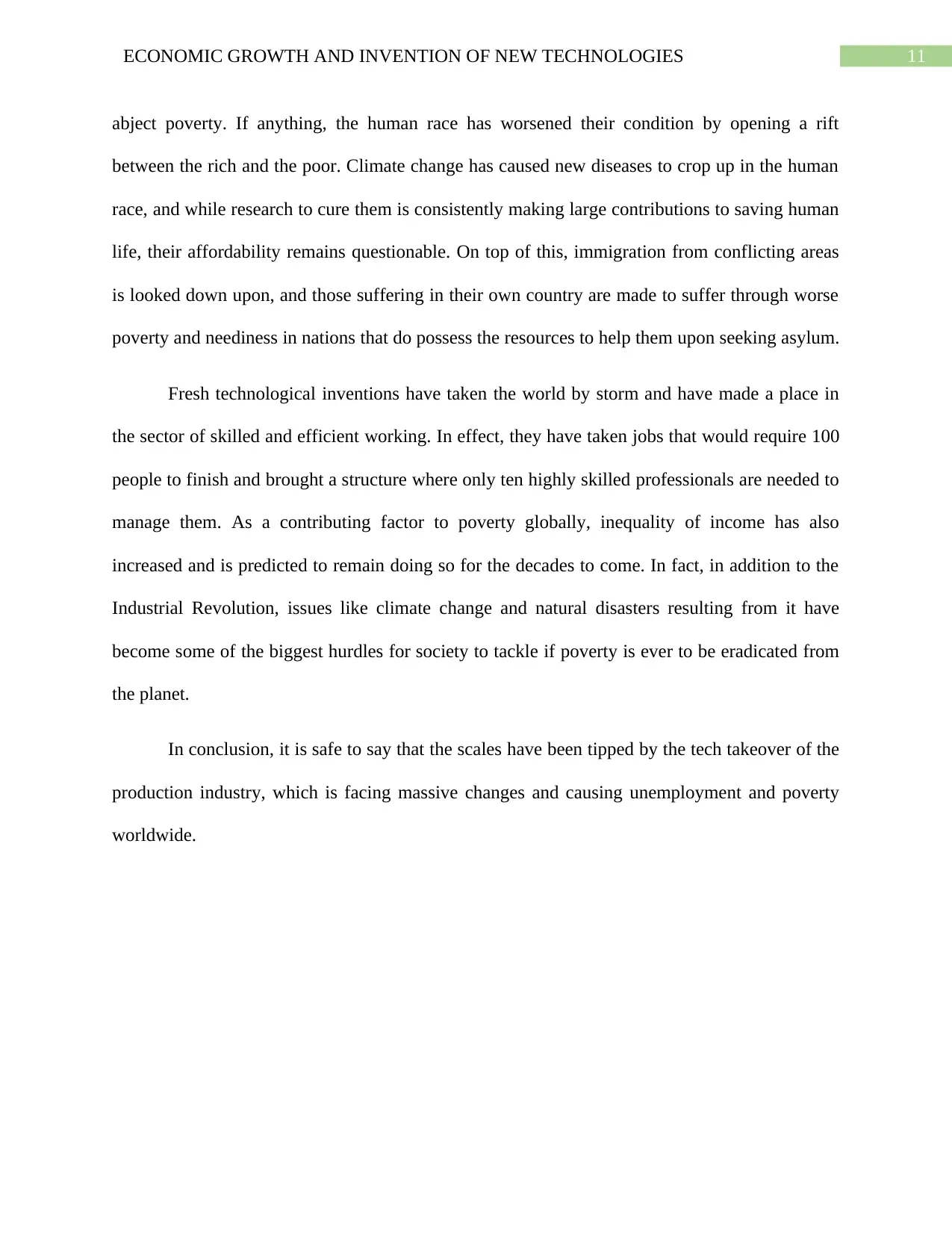
11ECONOMIC GROWTH AND INVENTION OF NEW TECHNOLOGIES
abject poverty. If anything, the human race has worsened their condition by opening a rift
between the rich and the poor. Climate change has caused new diseases to crop up in the human
race, and while research to cure them is consistently making large contributions to saving human
life, their affordability remains questionable. On top of this, immigration from conflicting areas
is looked down upon, and those suffering in their own country are made to suffer through worse
poverty and neediness in nations that do possess the resources to help them upon seeking asylum.
Fresh technological inventions have taken the world by storm and have made a place in
the sector of skilled and efficient working. In effect, they have taken jobs that would require 100
people to finish and brought a structure where only ten highly skilled professionals are needed to
manage them. As a contributing factor to poverty globally, inequality of income has also
increased and is predicted to remain doing so for the decades to come. In fact, in addition to the
Industrial Revolution, issues like climate change and natural disasters resulting from it have
become some of the biggest hurdles for society to tackle if poverty is ever to be eradicated from
the planet.
In conclusion, it is safe to say that the scales have been tipped by the tech takeover of the
production industry, which is facing massive changes and causing unemployment and poverty
worldwide.
abject poverty. If anything, the human race has worsened their condition by opening a rift
between the rich and the poor. Climate change has caused new diseases to crop up in the human
race, and while research to cure them is consistently making large contributions to saving human
life, their affordability remains questionable. On top of this, immigration from conflicting areas
is looked down upon, and those suffering in their own country are made to suffer through worse
poverty and neediness in nations that do possess the resources to help them upon seeking asylum.
Fresh technological inventions have taken the world by storm and have made a place in
the sector of skilled and efficient working. In effect, they have taken jobs that would require 100
people to finish and brought a structure where only ten highly skilled professionals are needed to
manage them. As a contributing factor to poverty globally, inequality of income has also
increased and is predicted to remain doing so for the decades to come. In fact, in addition to the
Industrial Revolution, issues like climate change and natural disasters resulting from it have
become some of the biggest hurdles for society to tackle if poverty is ever to be eradicated from
the planet.
In conclusion, it is safe to say that the scales have been tipped by the tech takeover of the
production industry, which is facing massive changes and causing unemployment and poverty
worldwide.
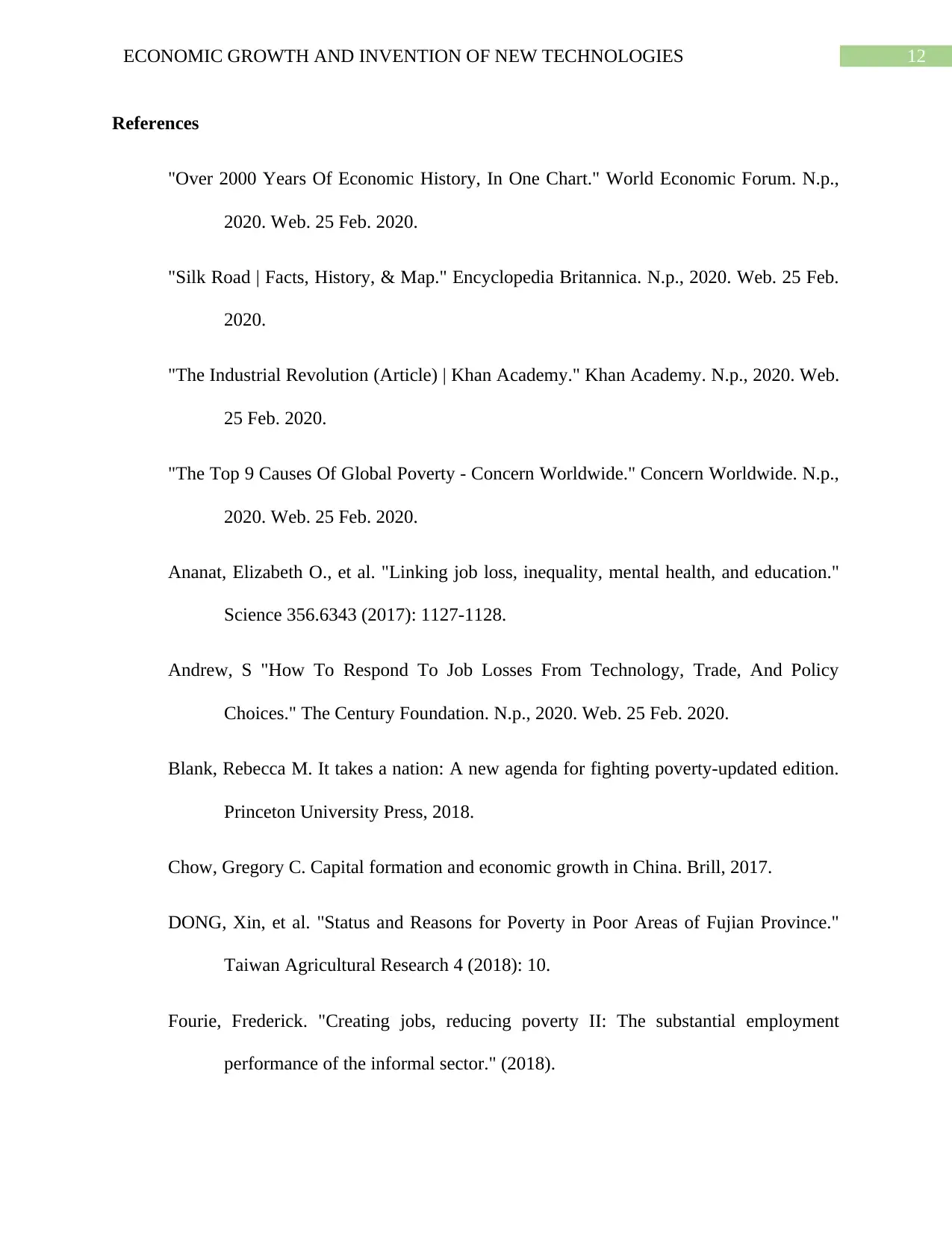
12ECONOMIC GROWTH AND INVENTION OF NEW TECHNOLOGIES
References
"Over 2000 Years Of Economic History, In One Chart." World Economic Forum. N.p.,
2020. Web. 25 Feb. 2020.
"Silk Road | Facts, History, & Map." Encyclopedia Britannica. N.p., 2020. Web. 25 Feb.
2020.
"The Industrial Revolution (Article) | Khan Academy." Khan Academy. N.p., 2020. Web.
25 Feb. 2020.
"The Top 9 Causes Of Global Poverty - Concern Worldwide." Concern Worldwide. N.p.,
2020. Web. 25 Feb. 2020.
Ananat, Elizabeth O., et al. "Linking job loss, inequality, mental health, and education."
Science 356.6343 (2017): 1127-1128.
Andrew, S "How To Respond To Job Losses From Technology, Trade, And Policy
Choices." The Century Foundation. N.p., 2020. Web. 25 Feb. 2020.
Blank, Rebecca M. It takes a nation: A new agenda for fighting poverty-updated edition.
Princeton University Press, 2018.
Chow, Gregory C. Capital formation and economic growth in China. Brill, 2017.
DONG, Xin, et al. "Status and Reasons for Poverty in Poor Areas of Fujian Province."
Taiwan Agricultural Research 4 (2018): 10.
Fourie, Frederick. "Creating jobs, reducing poverty II: The substantial employment
performance of the informal sector." (2018).
References
"Over 2000 Years Of Economic History, In One Chart." World Economic Forum. N.p.,
2020. Web. 25 Feb. 2020.
"Silk Road | Facts, History, & Map." Encyclopedia Britannica. N.p., 2020. Web. 25 Feb.
2020.
"The Industrial Revolution (Article) | Khan Academy." Khan Academy. N.p., 2020. Web.
25 Feb. 2020.
"The Top 9 Causes Of Global Poverty - Concern Worldwide." Concern Worldwide. N.p.,
2020. Web. 25 Feb. 2020.
Ananat, Elizabeth O., et al. "Linking job loss, inequality, mental health, and education."
Science 356.6343 (2017): 1127-1128.
Andrew, S "How To Respond To Job Losses From Technology, Trade, And Policy
Choices." The Century Foundation. N.p., 2020. Web. 25 Feb. 2020.
Blank, Rebecca M. It takes a nation: A new agenda for fighting poverty-updated edition.
Princeton University Press, 2018.
Chow, Gregory C. Capital formation and economic growth in China. Brill, 2017.
DONG, Xin, et al. "Status and Reasons for Poverty in Poor Areas of Fujian Province."
Taiwan Agricultural Research 4 (2018): 10.
Fourie, Frederick. "Creating jobs, reducing poverty II: The substantial employment
performance of the informal sector." (2018).
Paraphrase This Document
Need a fresh take? Get an instant paraphrase of this document with our AI Paraphraser
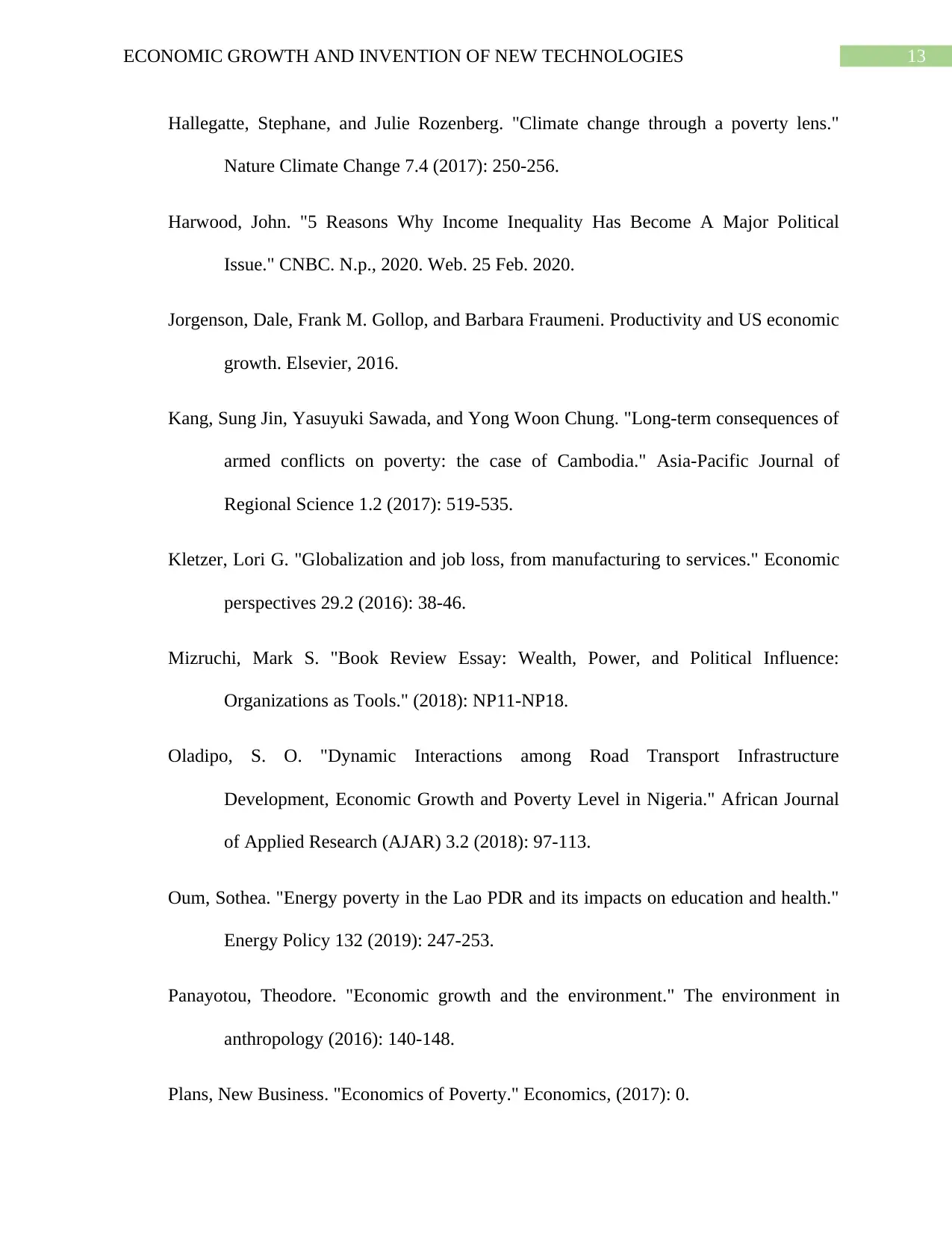
13ECONOMIC GROWTH AND INVENTION OF NEW TECHNOLOGIES
Hallegatte, Stephane, and Julie Rozenberg. "Climate change through a poverty lens."
Nature Climate Change 7.4 (2017): 250-256.
Harwood, John. "5 Reasons Why Income Inequality Has Become A Major Political
Issue." CNBC. N.p., 2020. Web. 25 Feb. 2020.
Jorgenson, Dale, Frank M. Gollop, and Barbara Fraumeni. Productivity and US economic
growth. Elsevier, 2016.
Kang, Sung Jin, Yasuyuki Sawada, and Yong Woon Chung. "Long-term consequences of
armed conflicts on poverty: the case of Cambodia." Asia-Pacific Journal of
Regional Science 1.2 (2017): 519-535.
Kletzer, Lori G. "Globalization and job loss, from manufacturing to services." Economic
perspectives 29.2 (2016): 38-46.
Mizruchi, Mark S. "Book Review Essay: Wealth, Power, and Political Influence:
Organizations as Tools." (2018): NP11-NP18.
Oladipo, S. O. "Dynamic Interactions among Road Transport Infrastructure
Development, Economic Growth and Poverty Level in Nigeria." African Journal
of Applied Research (AJAR) 3.2 (2018): 97-113.
Oum, Sothea. "Energy poverty in the Lao PDR and its impacts on education and health."
Energy Policy 132 (2019): 247-253.
Panayotou, Theodore. "Economic growth and the environment." The environment in
anthropology (2016): 140-148.
Plans, New Business. "Economics of Poverty." Economics, (2017): 0.
Hallegatte, Stephane, and Julie Rozenberg. "Climate change through a poverty lens."
Nature Climate Change 7.4 (2017): 250-256.
Harwood, John. "5 Reasons Why Income Inequality Has Become A Major Political
Issue." CNBC. N.p., 2020. Web. 25 Feb. 2020.
Jorgenson, Dale, Frank M. Gollop, and Barbara Fraumeni. Productivity and US economic
growth. Elsevier, 2016.
Kang, Sung Jin, Yasuyuki Sawada, and Yong Woon Chung. "Long-term consequences of
armed conflicts on poverty: the case of Cambodia." Asia-Pacific Journal of
Regional Science 1.2 (2017): 519-535.
Kletzer, Lori G. "Globalization and job loss, from manufacturing to services." Economic
perspectives 29.2 (2016): 38-46.
Mizruchi, Mark S. "Book Review Essay: Wealth, Power, and Political Influence:
Organizations as Tools." (2018): NP11-NP18.
Oladipo, S. O. "Dynamic Interactions among Road Transport Infrastructure
Development, Economic Growth and Poverty Level in Nigeria." African Journal
of Applied Research (AJAR) 3.2 (2018): 97-113.
Oum, Sothea. "Energy poverty in the Lao PDR and its impacts on education and health."
Energy Policy 132 (2019): 247-253.
Panayotou, Theodore. "Economic growth and the environment." The environment in
anthropology (2016): 140-148.
Plans, New Business. "Economics of Poverty." Economics, (2017): 0.
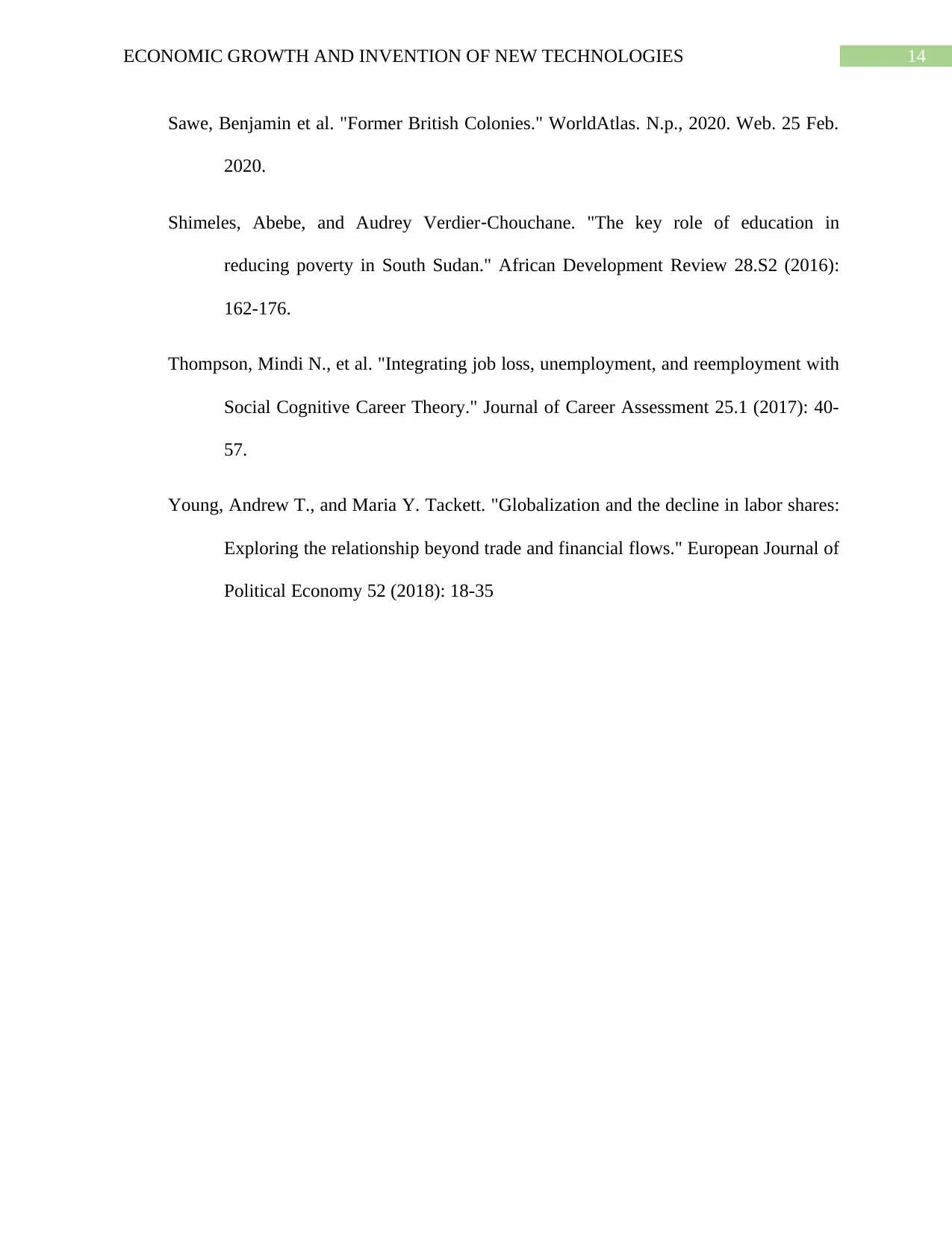
14ECONOMIC GROWTH AND INVENTION OF NEW TECHNOLOGIES
Sawe, Benjamin et al. "Former British Colonies." WorldAtlas. N.p., 2020. Web. 25 Feb.
2020.
Shimeles, Abebe, and Audrey Verdier‐Chouchane. "The key role of education in
reducing poverty in South Sudan." African Development Review 28.S2 (2016):
162-176.
Thompson, Mindi N., et al. "Integrating job loss, unemployment, and reemployment with
Social Cognitive Career Theory." Journal of Career Assessment 25.1 (2017): 40-
57.
Young, Andrew T., and Maria Y. Tackett. "Globalization and the decline in labor shares:
Exploring the relationship beyond trade and financial flows." European Journal of
Political Economy 52 (2018): 18-35
Sawe, Benjamin et al. "Former British Colonies." WorldAtlas. N.p., 2020. Web. 25 Feb.
2020.
Shimeles, Abebe, and Audrey Verdier‐Chouchane. "The key role of education in
reducing poverty in South Sudan." African Development Review 28.S2 (2016):
162-176.
Thompson, Mindi N., et al. "Integrating job loss, unemployment, and reemployment with
Social Cognitive Career Theory." Journal of Career Assessment 25.1 (2017): 40-
57.
Young, Andrew T., and Maria Y. Tackett. "Globalization and the decline in labor shares:
Exploring the relationship beyond trade and financial flows." European Journal of
Political Economy 52 (2018): 18-35

15ECONOMIC GROWTH AND INVENTION OF NEW TECHNOLOGIES
1 out of 16
Related Documents
Your All-in-One AI-Powered Toolkit for Academic Success.
+13062052269
info@desklib.com
Available 24*7 on WhatsApp / Email
![[object Object]](/_next/static/media/star-bottom.7253800d.svg)
Unlock your academic potential
© 2024 | Zucol Services PVT LTD | All rights reserved.




